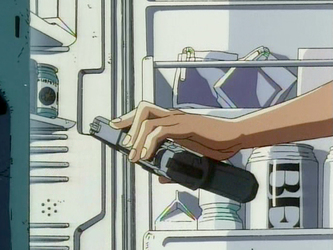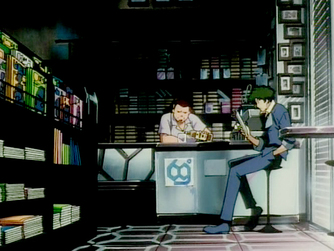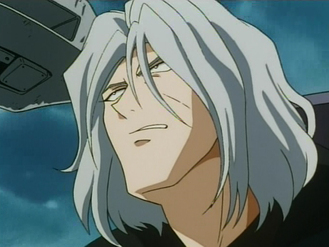GUEST ESSAY: BEBOP FAQ ANSWERED
WARNING: This article contains ENDING SPOILERS
[Leigh: In the original iteration of Cowboy Bebop Attic, I posed some questions and little niggles about the series that I could not solve. Aaron M.K. sent in his take on the FAQs.]

Q. In #5 Ballad of Fallen Angels, why does Spike pull a gun out of the fridge as he's preparing for his battle with Vicious? Is it just to keep it cool and dry so it doesn't jam?
There are two parts to the answer - first,the practicality and then, the reasoning.
Honestly keeping firearms in the fridge is bad idea. Only certain firearms can withstand the degree of cold for that length of time and still function without jamming. Long term effects would most likely be rust. The most pressing matter would be ice crystals forming in both the chamber and trigger mechanism, rendering the gun useless until it thaws.
That being said, there are weapons that are rated, tested and designed to withstand refrigerator conditions. Some of these guns are even used in the show - Faye's very own Glock 30 could put into the freezer and completely turn into a block of ice and still be able to fire as soon as you took it out. While this is not advisable, it is nonetheless completely within the parameters of the firearm. The Beretta 92F that Spike pulls from his fridge in the BoFA scene would be able to stay in the fridge/freezer for a good long while if proper maintenance was administered.
My answer for why it was in the fridge is this: A man who leads that dangerous a life and has that many weapons in the first place would most likely stash them everywhere so he would always have one close at hand. Stashing weapons in unexpected places is an old CIA trick for paranoid people. Imagine - who would expect you to pull a pistol from the fridge or some innocuous furniture? It has become a popular trick in movies. Case in point: in the Bourne Supremacy, Jason Bourne recovers a pistol from a picture frame designed to hide weapons; in the movie Taken, a side character goes to retrieve a pistol from beneath his bathroom sink. Coming back to Cowboy Bebop, it is more likely than not that Spike had weapons stashed everywhere to give him home field advantage if a fight was ever to occur onboard the Bebop.
There are two parts to the answer - first,the practicality and then, the reasoning.
Honestly keeping firearms in the fridge is bad idea. Only certain firearms can withstand the degree of cold for that length of time and still function without jamming. Long term effects would most likely be rust. The most pressing matter would be ice crystals forming in both the chamber and trigger mechanism, rendering the gun useless until it thaws.
That being said, there are weapons that are rated, tested and designed to withstand refrigerator conditions. Some of these guns are even used in the show - Faye's very own Glock 30 could put into the freezer and completely turn into a block of ice and still be able to fire as soon as you took it out. While this is not advisable, it is nonetheless completely within the parameters of the firearm. The Beretta 92F that Spike pulls from his fridge in the BoFA scene would be able to stay in the fridge/freezer for a good long while if proper maintenance was administered.
My answer for why it was in the fridge is this: A man who leads that dangerous a life and has that many weapons in the first place would most likely stash them everywhere so he would always have one close at hand. Stashing weapons in unexpected places is an old CIA trick for paranoid people. Imagine - who would expect you to pull a pistol from the fridge or some innocuous furniture? It has become a popular trick in movies. Case in point: in the Bourne Supremacy, Jason Bourne recovers a pistol from a picture frame designed to hide weapons; in the movie Taken, a side character goes to retrieve a pistol from beneath his bathroom sink. Coming back to Cowboy Bebop, it is more likely than not that Spike had weapons stashed everywhere to give him home field advantage if a fight was ever to occur onboard the Bebop.

Q. Besides being a maternal figure to Spike, in what ways is Annie important?
I always considered Annie to represent both the mother he never had and, more importantly, the innocence of his childhood. Interestingly enough, despite the show's heavy dwelling on each character's past, Spike's childhood is something we don't hear much about.
I consider the RFB sequence to be akin to Spike's whole life portrayed in metaphorical stages, or a representation of the unlucky cycle that his life was caught in.
The Loser's Bar shootout scene in #25 RFB I in some ways represents Spike's early childhood, when he was introduced to the maelstrom that is the Red Dragon syndicate. Then his saving grace, Shin, comes to help him ward off the syndicate, much like the way I'd imagine Vicious had done in those early syndicate days. And, of course, Jet's wounding could be taken as a catalyst that sent Spike to face off with the syndicate.
As the RFB plot continues to develop, we see Spike finding his love, Julia, much like the way he did the first time round. This represents his twilight days in the syndicate and the struggles he went through that ultimately changed his outlook on life and resulted in him leaving Red Dragon.
Annie dies soon after, representing the innocence being lost and Spike's final transformation into the man he is at this point of the the story, like a bittersweet coming of age. Annie's death also bears a parallel to how he had lost Julia - both due to Vicious and the syndicate.
Here's where it gets more interesting. I think the instant Spike finds out that he is losing Annie literally, he loses Julia metaphorically. At this point, he's ready to run away again like last time or, as you had put it in one of your essays, "leave it in the fridge".
When he loses Julia mere moments later, she tells him it's all a dream. I think it is in that instant that Spike realizes he's been caught in an endless cycle, that in his quest for the perfect dream he created his own cyclical nightmare through his actions over the span of his lifetime.
In facing Vicious, he took that "lobster out of the fridge", so to speak, and broke the cycle of his life. Only by ending his life in this way could he ever find peace within himself. I think that the entire series was the story of a man whom had been born in and carried with him a destructive atmosphere that he couldn't seem to break through and overcome.
The CB movie helps to clarify Spike's journey and it's significance towards the end of the series. The villain, Vincent, whom Spike chases throughout the movie plays a big role in Spike's realisation of his own destructive path as Vincent's nothing more than a Spike Spiegel who had lost his way in his dreams, dreams which both men had used as a means to escape from their own pain. I could go into the parallels between the two but that's gonna take a lot longer! Alright, I've gotten so far away from the original question I think I should just end it here.
I always considered Annie to represent both the mother he never had and, more importantly, the innocence of his childhood. Interestingly enough, despite the show's heavy dwelling on each character's past, Spike's childhood is something we don't hear much about.
I consider the RFB sequence to be akin to Spike's whole life portrayed in metaphorical stages, or a representation of the unlucky cycle that his life was caught in.
The Loser's Bar shootout scene in #25 RFB I in some ways represents Spike's early childhood, when he was introduced to the maelstrom that is the Red Dragon syndicate. Then his saving grace, Shin, comes to help him ward off the syndicate, much like the way I'd imagine Vicious had done in those early syndicate days. And, of course, Jet's wounding could be taken as a catalyst that sent Spike to face off with the syndicate.
As the RFB plot continues to develop, we see Spike finding his love, Julia, much like the way he did the first time round. This represents his twilight days in the syndicate and the struggles he went through that ultimately changed his outlook on life and resulted in him leaving Red Dragon.
Annie dies soon after, representing the innocence being lost and Spike's final transformation into the man he is at this point of the the story, like a bittersweet coming of age. Annie's death also bears a parallel to how he had lost Julia - both due to Vicious and the syndicate.
Here's where it gets more interesting. I think the instant Spike finds out that he is losing Annie literally, he loses Julia metaphorically. At this point, he's ready to run away again like last time or, as you had put it in one of your essays, "leave it in the fridge".
When he loses Julia mere moments later, she tells him it's all a dream. I think it is in that instant that Spike realizes he's been caught in an endless cycle, that in his quest for the perfect dream he created his own cyclical nightmare through his actions over the span of his lifetime.
In facing Vicious, he took that "lobster out of the fridge", so to speak, and broke the cycle of his life. Only by ending his life in this way could he ever find peace within himself. I think that the entire series was the story of a man whom had been born in and carried with him a destructive atmosphere that he couldn't seem to break through and overcome.
The CB movie helps to clarify Spike's journey and it's significance towards the end of the series. The villain, Vincent, whom Spike chases throughout the movie plays a big role in Spike's realisation of his own destructive path as Vincent's nothing more than a Spike Spiegel who had lost his way in his dreams, dreams which both men had used as a means to escape from their own pain. I could go into the parallels between the two but that's gonna take a lot longer! Alright, I've gotten so far away from the original question I think I should just end it here.

Q. In #12 Jupiter Jazz I, why does Vicious tell Shin, "If you want to survive, you must sometimes betray me"? That sounds semi-suicidal, coming from a leader...?
Actually, It's quite a natural thing to assume (If not say) for a leader. Sort of a "The son shall take place of the father" so to speak. It also could allude to the fact that viscous doesn't want spineless "yes men" in his organization, Much like the ones who obliged the elders. He'd rather have brash, young, ambitious upstarts staying completely devoted to the cause (while still doing enough dirty dealings to cut their own secret profits) of making money and maintaining power than men who would just sit on their ass in fear of reprisal for sneezing at the wrong time. In some ways it reminds me of the relationship Fidel Castro shared with his field officer and right hand man Che Guevara doing the Cuban Resistance movement in the late 50's. According to sources from that time, Fidel (Future and current dictator of Cuba) knew that Che would eventually cause him a problem (which he ultimately did), But it was far better to keep him close as long as possible to benefit from his fanatical devotion that wasn't dependent on needing Fidel's constant approval. I guess the best way to describe it is keeping a vicious guard dog. It's dangerous to have but on the flip side it'll keep you safe, And if you play your cards right you'll always have the advantage over that dog for when the day comes that the dog turns on you.
Actually, It's quite a natural thing to assume (If not say) for a leader. Sort of a "The son shall take place of the father" so to speak. It also could allude to the fact that viscous doesn't want spineless "yes men" in his organization, Much like the ones who obliged the elders. He'd rather have brash, young, ambitious upstarts staying completely devoted to the cause (while still doing enough dirty dealings to cut their own secret profits) of making money and maintaining power than men who would just sit on their ass in fear of reprisal for sneezing at the wrong time. In some ways it reminds me of the relationship Fidel Castro shared with his field officer and right hand man Che Guevara doing the Cuban Resistance movement in the late 50's. According to sources from that time, Fidel (Future and current dictator of Cuba) knew that Che would eventually cause him a problem (which he ultimately did), But it was far better to keep him close as long as possible to benefit from his fanatical devotion that wasn't dependent on needing Fidel's constant approval. I guess the best way to describe it is keeping a vicious guard dog. It's dangerous to have but on the flip side it'll keep you safe, And if you play your cards right you'll always have the advantage over that dog for when the day comes that the dog turns on you.
Want to share your thoughts on this essay? Join in the discussion in the Comments section:
HTML Comment Box is loading comments...
